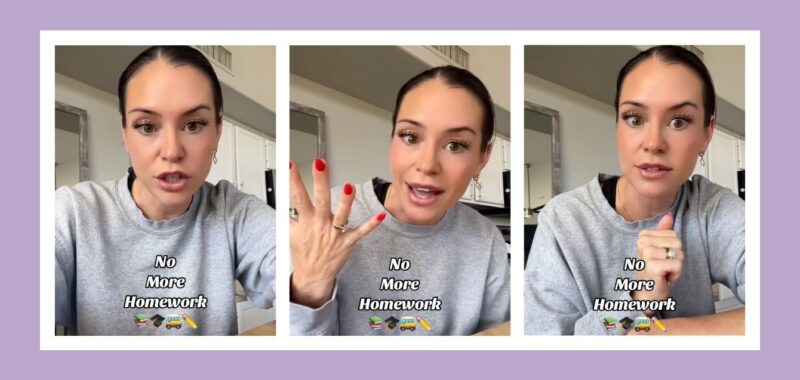When you were in school, don’t you wish you could have had the choice to opt out of homework? One mom is going viral online for choosing to do just that with her son, and it’s creating a lot of conversation online.
An Arizona mom who posts to TikTok as @cayleyxox created the now-viral video, where she announced, “For any parents that might not know this, and I just recently learned this, is that you can actually opt out of homework for your children.”
That’s a little misleading, as we’ll learn later in her story, but for now, here are the details.
“I didn’t know that until recently, and I just sent my son’s kindergarten teacher a cute little email saying, ‘I’m sorry, based on the stress, mental, physical anxiety it’s causing my kid, we are done. We are done opting out for the rest of the year,’” she said.
She then explained what led to that decision.
“On the first week of school … he got this packet. It’s for August. It doesn’t look like it’s all that bad, but it’s about 15 to 20 pages double-sided. You do the math. We have been working on it and trying to work on it to the best of our abilities, and it is causing him so much mental, physical stress,” she said. “This morning I had him sit down. I felt so guilty for this. We were sitting down, I told him, ‘You can’t even watch a show this morning. You can’t do anything. It’s going to be radio silence until you sit here and eat your breakfast and finish at least one or two pages of this. Because you’re way behind.’ This is so much work for him. I started crying. He started crying. It was an emotional mess.”
She went on to say her son was upset about having to go to school because of his homework stress, “which hurts my mama heart because you were five. Five. You were in kindergarten. The only thing that you should be worried about is learning and what time snack time is,” she added.
“What are we teaching kids? What are we teaching them? That, ‘Oh, yeah, here you go. You’re going to go to work and you’re going to be paid salary, but it doesn’t matter if you don’t finish your work in the eight to ten hours that you’re there Monday through Friday. You’re going to bring that work home and you’re going to do that on your own time,” she continued. “No … not up in here. We are not teaching our children that. Work to live. We don’t live to work … In this household, we’re done doing homework. I want my kids to love school. I want him to love to learn. I want him to have fun. I want to enjoy it.”
Her message got mixed reviews from commenters. Some were firmly on her side, but others thought she was teaching her son to be entitled by telling him he could just not do his homework, and that she was creating a sticky situation for his teacher.
“I agree with you but know the teachers are allowed to find time for the student to make up the work you are declining and it’s going to be recess,” one commenter wrote.
Another added, “I hear this, but then I think how 50% of the population has a 7th grade reading level in the USA.”
In an update, Cayley shared how her son’s teacher responded to her opt out request: She said she had never gotten a “complaint” about homework, to which Cayley said she wasn’t complaining, just “addressing the situation that’s no longer gonna work for their family.”
After some negotiations, they settled on a reading log of 15-20 minutes per night to replace her son’s “homework.”
What do the experts say about homework and young kids?
One of the most notable talking points about homework is how it disproportionately affects students from less affluent families. The American Psychological Association (APA) explained:
“Kids from wealthier homes are more likely to have resources such as computers, internet connections, dedicated areas to do schoolwork and parents who tend to be more educated and more available to help them with tricky assignments. Kids from disadvantaged homes are more likely to work at afterschool jobs, or to be home without supervision in the evenings while their parents work multiple jobs.”
There are a few other reasons why homework can have a more negative impact on lower-income students:
- Access to resources: Lower-income students may have less access to things like a quiet study space, reliable internet, educational supplies, or help from parents/guardians. This makes it more challenging for them to complete homework effectively.
- Time constraints: Lower-income students are more likely to have after-school responsibilities like caring for siblings, working a part-time job, or commuting long distances. This leaves them with less time and energy for homework.
- Stress and mental health: The added burden of homework on top of other life stressors can exacerbate mental health issues like anxiety and depression, which are more prevalent among lower-income youth.
- Widening achievement gaps: Because homework widens the learning gap between students with more and fewer resources, it can perpetuate and even worsen educational inequalities over time.
The key point is that homework, while intended to reinforce learning, can actually disadvantage lower-income students who face additional obstacles outside of school. Addressing these disparities in access and support is important for creating more equitable educational outcomes.

